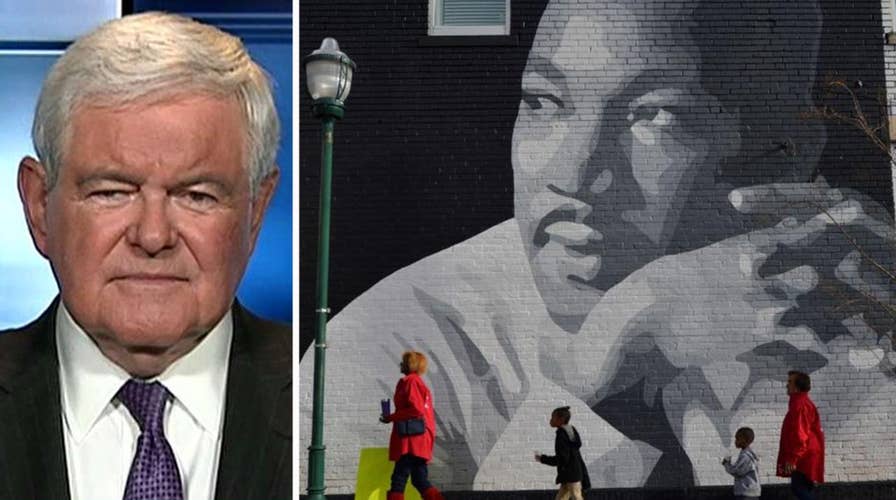Gingrich: US still far from Martin Luther King's dream
Fox News contributor warns against 'toxic identity politics.'
On Monday, as we celebrate the birthday and life of Dr. Martin Luther King Jr., it would be powerful if every American would remember the heart of his “I Have a Dream” speech.
It is one of the most powerful and inspirational speeches in American history. Delivered on August 28, 1963 to more than 200,000 people while standing in front of the Lincoln Memorial, Dr. King personalized his dream, saying: “I have a dream that my four little children will one day live in a nation where they will not be judged by the color of their skin but by the content of their character.”
Today, almost 55 years later, we are still all too far from achieving Dr. King’s dream.
It is important to remember the tragic history of African-Americans.
When people question why African-Americans should be considered differently than other immigrant groups, they miss the whole point of the African-American experience.
All of us should take this holiday to reflect on Dr. King’s dream, the obligation all of us have to turn this dream into reality, and the responsibility we bear to ensure that America always strives to live up to its ideals.
Sold as slaves, shipped in cruel and inhuman conditions, totally dominated by white owners, African-Americans had only as much family stability as their white owners permitted. The first two centuries of African-American life in America violated every ideal to which America is committed.
Despite these conditions, individuals began to rise from the system of slavery. Frederick Douglass was the most famous black orator of the 19th century and spoke passionately for the liberation of slaves. Throughout the North before the Civil War there were more and more free African-Americans (as there also were in New Orleans, for historic reasons).
Americans fought their bloodiest war over slavery. More Americans died in the Civil War than all our other wars combined, through part of the Vietnam War.
President Abraham Lincoln signed the Emancipation Proclamation in 1863, freeing the slaves in Confederate states that had not yet surrendered to the Union. Constitutional Amendments were adopted at the end of the war ending slavery and guaranteeing freedom nationwide.
For a few brief years America moved toward genuine freedom, with the United States Army enforcing desegregation in the South – something it would do again a century later.
However, decades of pressure from anti-black political muscle in the South gradually reasserted legal segregation to minimize African-American rights and opportunities.
Despite the betrayal of President Lincoln’s vision, a substantial number of African-Americans began rising in education, economics and status. Then mobilization of the workforce for World War II created vast new opportunities as Southern blacks migrated to Detroit and elsewhere to work in industries that had lost workers to the war effort.
Furthermore, a substantial number of African-Americans served in the military. Finally, the revulsion against Nazi racism began to delegitimize and undermine racism in America.
As African-Americans yearned for true equality, a young minister emerged as their most powerful voice. Dr. Martin Luther King, Jr., brilliantly combined great rhetorical skill with a deep understanding of the Bible and of the essence of America’s best ideals, as articulated in the Declaration of Independence and in the speeches and writings of Thomas Jefferson and President Lincoln.
Unfortunately, we have not yet attained the America that Dr. King called for. We still have far too much racial feeling among all ethnic groups. We still tolerate poor children being crushed by incompetent and corrupt bureaucracies that spend huge amounts of money but fail to educate.
We still allow far too many young men to languish in prison without hope, when we should be offering them second chances. We still have too many people without jobs because crime keeps small businesses from being opened in neglected neighborhoods.
Faced with these failures, some Americans have given up on Dr. King’s dream and have begun to advocate a form of toxic identity politics that abandons colorblindness as an ideal.
All of us should take this holiday to reflect on Dr. King’s dream, the obligation all of us have to turn this dream into reality, and the responsibility we bear to ensure that America always strives to live up to its ideals.
This is the response Dr. King would have wanted for his birthday.

